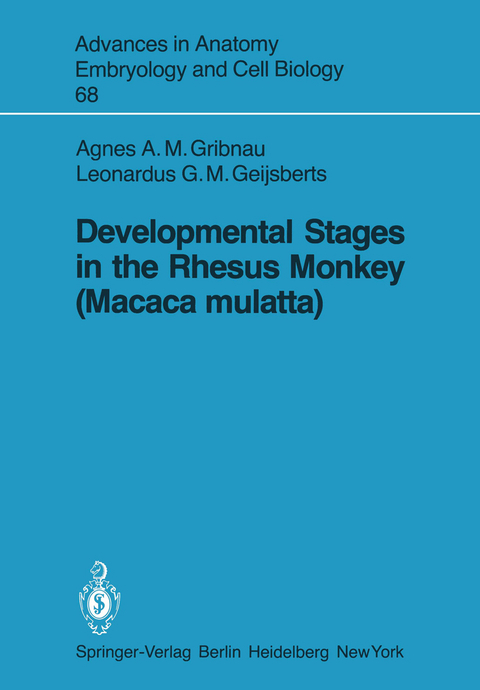
Developmental Stages in the Rhesus Monkey (Macaca mulatta)
Seiten
1981
|
1981
Springer Berlin (Verlag)
978-3-540-10469-8 (ISBN)
Springer Berlin (Verlag)
978-3-540-10469-8 (ISBN)
In the past decennia nonhuman primates have been increasingly used for research purposes in various scientific fields. Much interest has been focused on this group of animals in general and on the rhesus monkey in particular because of its close phylo genetic relationship with man. In some fields of research, however, such as embryology and microscopic anatomy, much less attention has been paid to nonhuman primates, probably because of the expense involved in the collection of the extensive material needed. On the other hand, teratological and experimental embryologic studies must be based upon a thorough knowledge of the normal ontogenesis since only in that way can a reliable distinction be made between normal and abnormal or induced develop ment. Each ontogenetic study essentially consists of a comparison of different deve lopmental stages. In most reports dealing with the development of individual organs or their subunits the material used is classified according to the estimated age or the length of the embryos. These criteria, however, are not valid, since considerable varia tion in developmental stage occurs between animals of the same age even between littermates and between animals of the same length. Therefore a method is needed for assigning embryos to successive developmental stages that are defmed on the basis of extemal and internal characteristics. This type of classification was elaborated by Stree ter (1942, 1945, 1948,1951), who arranged human embryos into developmental hori zons numbered XI through XXIII.
1 Introduction.- 2 Materials and Methods.- 2.1 Animals.- 2.2 Breeding Method and Pregnancy Diagnosis.- 2.3 Estimation of Embryonic Age.- 2.4 Hysterotomy Technique.- 2.5 Collection and Processing of the Embryos.- 2.6 Photography.- 3 Description of the Stages.- 3.1 Stage 13.- 3.2 Stage 14.- 3.3 Stage 15.- 3.4 Stage 16.- 3.5 Stage 17.- 3.6 Stage 18.- 3.7 Stage 19.- 3.8 Stage 20.- 3.9 Stage 21.- 3.10 Stage 22.- 3.11 Stage 23.- 4 Discussion.- 5 Summary.- References.
| Erscheint lt. Verlag | 1.3.1981 |
|---|---|
| Reihe/Serie | Advances in Anatomy, Embryology and Cell Biology |
| Zusatzinfo | VI, 86 p. 25 illus. |
| Verlagsort | Berlin |
| Sprache | englisch |
| Maße | 170 x 244 mm |
| Gewicht | 215 g |
| Themenwelt | Studium ► 1. Studienabschnitt (Vorklinik) ► Anatomie / Neuroanatomie |
| ISBN-10 | 3-540-10469-0 / 3540104690 |
| ISBN-13 | 978-3-540-10469-8 / 9783540104698 |
| Zustand | Neuware |
| Haben Sie eine Frage zum Produkt? |
Mehr entdecken
aus dem Bereich
aus dem Bereich
Buch | Hardcover (2022)
Urban & Fischer in Elsevier (Verlag)
CHF 307,95
Struktur und Funktion
Buch | Softcover (2021)
Urban & Fischer in Elsevier (Verlag)
CHF 61,60
+ Web + Lehrbuch
Buch | Hardcover (2022)
Urban & Fischer in Elsevier (Verlag)
CHF 348,55


